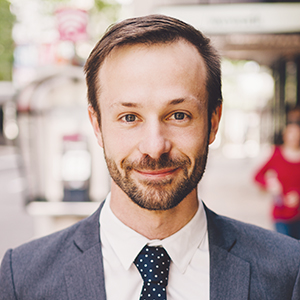Allowing health care providers to conscientiously object to specific clinical procedures respects their dignity, while refusing them the ability to act on deeply held beliefs could cause or exacerbate moral distress, ethicist Xavier Symons says.

"I think that restrictions on conscience in medicine may have off-target effects, namely, mainly, inadvertently dehumanizing the health care workforce," Symons explained during a webinar in June co-sponsored by CHA and several Catholic universities.
Symons, director of the Plunkett Centre for Ethics and an associate professor at the Australian Catholic University, discussed the meaning of conscience and its roots in the Catholic moral tradition. He noted, for example, that theologian and scholar St. Thomas Aquinas defined conscience as the capacity to apply general moral principles to specific situations.
"We might think of how the most general principle of 'Do no harm,' say, in medicine applies to a particular scenario that one encounters in one's clinical practice," Symons explained. "Conscience would be the capacity that allows one to determine how that general principle gets a grip on the concrete reality in front of one."
While abortion and euthanasia are commonly cited as examples of procedures health care professionals might refuse to participate in on moral grounds, Symons said those refusals might righteously extend to other procedures, such as some instances of cosmetic surgery or aggressive intensive care unit interventions. Conscientious objections, he said, could arise whenever "a health professional deems such interventions to be manifestly unethical."
Dividing personal, professional lives
Symons acknowledged that there are arguments against allowing health care workers to act on their beliefs by refusing to participate in specific procedures. The arguments include that such refusals create unpredictability in medicine, lead to inconvenience and sometimes harm to patients, and are out of keeping with the medical worker's commitment to the profession.
While he appreciates the stance that medical care providers need to be objective and impartial, Symons said he believes imposing a hard barrier between medical workers' personal values and professional conduct would be "psychologically unrealistic."
He noted that professional organizations acknowledge that personal life affects professional life. For example, doctors who act inappropriately outside their medical practice can face loss of their medical license.
"All I want to argue is that maybe, by the same token, we should think about how personal values should be allowed to manifest in professional work — good personal values — because it seems like we recognize that there's a porousness between the personal and the professional," Symons said.
Clashes between law and professional ethics on one side and personal conscience on the other can give rise to conscientious objection, Symons said. And rather than being viewed as a hindrance to good medical care, he said those objections can be seen as virtuous.
"Even if we may disagree with the substance of the objection, hopefully we can still recognize that there's something good about someone taking the moral demands of their professional life seriously in such a way that they are willing to kind of stick their head out, so to speak, and potentially suffer professional sanction, if they deem that they're being asked to do something which conflicts with some deeply held moral belief," he said.
Respecting human rights
In Symons' view, acting in line with one's values reflects a mature capacity for moral judgment. He said that capacity is a desirable one for health care professionals and should be encouraged and cultivated. He said it also should be respected by lawmakers and others who set health care policies.
"There's something very fundamental at stake here, which is the ability of human beings to act in accord with their perception of the good, of morality, of right and wrong," Symons said. "If human beings are not able to do that, then really are we interested at all in respect for human rights if we don't allow people in both their personal but also in their professional life to act in accord with their deeply considered view of what the right thing is to do in a particular situation?"
He said he worries that discussions of values and morality are overlooked in medical education, at least in his experience in Australia and the United States. He would like the training of health care professionals to include encouraging them to explore their morals and deep ethical questions.
"We need to pay a bit more attention to cultivating this trait, or set of traits, in medical students and other health students," Symons urged. "We need to make them able to discern the good in particular clinical situations."
